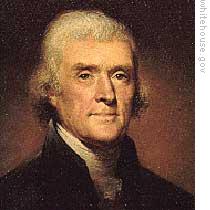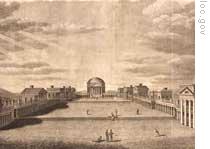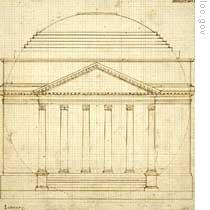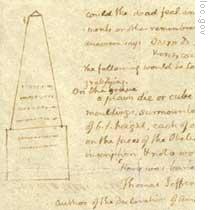VOA慢速英语-The MAKING OF A NATION - American History Series: Th
时间:2018-12-15 作者:英语课 分类:VOA慢速英语2008年(七)月
On his grave 1 he wanted written, ''Here was buried Thomas Jefferson -- author of the Declaration 2 of American Independence, of the Virginia Law for Religious Freedom, and Father of the University of Virginia.'' Transcript 3 of radio broadcast:
23 July 2008
Welcome to the MAKING OF A NATION – American history in VOA Special English.

Thomas Jefferson
Thomas Jefferson left the White House in March of eighteen hundred and nine. His secretary of state, James Madison, had been elected president. Jefferson believed the nation was in good hands. He returned to Monticello, his country home in Virginia, and never went back to Washington again. But Jefferson and the new president exchanged letters often. Jefferson offered advice on a number of problems that Madison faced as the nation's fourth president.
There were many visitors to Monticello. But Jefferson was happiest when he could discuss books, government, science and education.
This week in our series, Maurice Joyce and Kay Gallant 4 discuss the final days of Thomas Jefferson and his lasting 5 contributions -- to Virginia and the nation.
(MUSIC)
VOICE TWO:
Jefferson believed firmly in the value of education. His whole idea of government depended on the ability of citizens to make intelligent decisions. He spent the final years of his life building a better educational system for Virginia.
Jefferson had been interested in education for most of his life. He had developed many ideas about the best way to educate the people. He believed that every citizen had the right to an education. But, he understood that all people do not have the same ability to learn.
Jefferson divided the people into two groups: those who labor 6 and those who use their minds. He thought both should start with the same simple education -- learning 7 to read and write and count. After these things were learned 8, he believed the two groups should be taught separately.
Those in the labor group, he thought, should learn how to be better farmers or how to make things with their hands. The other group should study science, or medicine or law.
VOICE ONE:
Jefferson did not wait long to begin working to improve education in Virginia. A group of men decided 9 to build a college at Charlottesville, near Jefferson's home. Jefferson immediately offered to take a leading part in starting the school. He said he would plan the buildings and also plan what the students would study. He wrote to many of his friends -- experts in education. He asked for their advice.
One of the experts told Jefferson he should not include religion among the studies. Jefferson agreed. But he understood that leaving out religious studies would cause problems. He explained it this way:
"We cannot always do what is absolutely best. Those with whom we act have different ideas. They have the right and power to act on their ideas. We make progress only one step at a time. To do our fellow men the most good, we must lead where we can, follow where we cannot. But we must still go with them, watching always for the moment we can help them move forward another step."
(MUSIC)
VOICE TWO:

Detail of a University of Virginia map by Herman Boye
Jefferson began by planning a program of studies for the Charlottesville College. But he did not stop there. Before he finished, he had completed plans for a complete education system for Virginia. He proposed 10 a school system of three steps.
The first step would be elementary schools, where all children could learn reading, writing, arithmetic and geography. These schools would be built in all areas of the state and would be paid for by the people living in each area.
The second step would be colleges -- equal to the high schools of today. He proposed that nine of these schools be built in the state. Students would begin the study of science, or would study agriculture, or how to use their hands to make things. These schools would be paid for by the state.
The third step would be a state university, where students of great ability could go to get the best of educations. The university would produce the lawyers, doctors, professors, scientists and government leaders. Young men whose families had money would pay for their own educations. The state would pay the costs of a small number of bright students from poor families.
Jefferson also proposed that the University of Virginia be built at Charlottesville. He already had begun work on the college there and offered to give it to the university.
VOICE ONE:
His education program was offered to the Virginia legislature. Many lawmakers thought it was excellent. But many others opposed it. They did not want to raise taxes for the large amount of money such a system would cost.
The legislature, however, agreed to part of the plan. It approved a bill to help pay the cost of educating poor children. And it agreed to spend fifteen thousand dollars each year for a university. There was much debate about where the university should be built. Several other towns wanted the school. Finally, Charlottesville was chosen.
(MUSIC)
VOICE TWO:

Ink and pencil drawing by Thomas Jefferson of a building at the University of Virginia
By this time, Jefferson had completed plans for the university buildings. He borrowed many of his ideas from the beautiful buildings of ancient Greece and Rome. The buildings were so well planned that one hundred years later, when the university was to put up a new building, the builder could find no reason to change the plans drawn 11 by Jefferson.
Work began on the university immediately. But it was six years before the school was open to students.
Jefferson was there almost every day, watching the workmen 12. He was quick to criticize 13 any mistake or work that was not done well. When he was sick and not able to go down to the university, he would watch the work through a telescope from a window of his home.
The cost of the university kept growing. And Jefferson had to struggle to get the legislature to pay for it. He also worked hard to get the best possible professors to teach at the university. He sent men throughout the United States to find good teachers. He even sent a man to Europe for this purpose. Finally, in March, eighteen hundred twenty-five, the University of Virginia opened.
(MUSIC)
VOICE ONE:
Jefferson's health had suffered during his years of work for the university. He was eighty-two years old and feeling his age. He suffered from rheumatism 14 and diabetes 15, and was so weak he could walk only short distances. Jefferson also found his memory was failing.
He knew he did not have much longer to live. He told a friend one day: "When I look back over the ranks of those with whom I have lived and loved, it is like looking over a field of battle. All fallen."

Near the end of his life, Jefferson designed his own gravestone and prepared the words to be written on it
As his health grew worse, Jefferson turned his thoughts to death. He wrote how he wished to be buried. He wanted a simple grave on the mountainside below his house. He drew a picture of the kind of memorial he wanted put at his grave.
On this stone he wanted the statement: "Here was buried Thomas Jefferson -- author of the Declaration of American Independence, of the Virginia Law for Religious Freedom, and Father of the University of Virginia."
He did not choose his work as governor 16 of Virginia, secretary of state, or president. There was not a word about his purchase of the Louisiana Territory from France, which added so greatly to the United States. Jefferson did not explain why he chose the Declaration of Independence, the law for religious freedom, and the university as his greatest works 17.
VOICE TWO:
Writer Nathan Schachner, in his book on Jefferson, offers this explanation:
"He chose those points in his life when he performed some service in the unending struggle to free the human mind. Freedom from political tyranny 18, freedom from religious tyranny, and finally, freedom through education -- from all the tyrannies 19 that have ever clouded and held back the human spirit."
On the Fourth of July, eighteen twenty-six, the nation began its celebration of the fiftieth anniversary 20 of the Declaration of Independence. Then, from Boston, came news that former president John Adams had died. His last words were: "Thomas Jefferson still lives."
VOICE ONE:
But Adams was wrong. At ten minutes before ten in the morning, on that same Fourth of July, his friend, Thomas Jefferson, had died.
As the news of the deaths of the two great men spread across the country, the celebrations turned to mourning and sorrow. Jefferson was buried the next day, as he had ordered, in a simple grave on the quiet mountainside.
(MUSIC)
ANNOUNCER:
To learn more about America's third president, go to voaspecialenglish.com. We have transcripts 21, MP3s and podcasts of our programs along with historical images. Today's program was written by Frank 22 Beardsley. Join us each week for THE MAKING OF A NATION – an American history series in VOA Special English.
__
This is program #43 of THE MAKING OF A NATION
- Marriage is the grave of love.婚姻是爱情的坟墓。
- This is a very grave matter indeed.这问题的确非常严重。
- We read the declaration posted on the bulletin board.我们读了贴在布告板上的声明。
- At the recent convention a declaration was adopted.在最近举行的大会上通过了一项宣言。
- A transcript of the tapes was presented as evidence in court.一份录音带的文字本作为证据被呈交法庭。
- They wouldn't let me have a transcript of the interview.他们拒绝给我一份采访的文字整理稿。
- Huang Jiguang's gallant deed is known by all men. 黄继光的英勇事迹尽人皆知。
- These gallant soldiers will protect our country.这些勇敢的士兵会保卫我们的国家的。
- The lasting war debased the value of the dollar.持久的战争使美元贬值。
- We hope for a lasting settlement of all these troubles.我们希望这些纠纷能获得永久的解决。
- We are never late in satisfying him for his labor.我们从不延误付给他劳动报酬。
- He was completely spent after two weeks of hard labor.艰苦劳动两周后,他已经疲惫不堪了。
- When you are learning to ride a bicycle,you often fall off.初学骑自行车时,常会从车上掉下来。
- Learning languages isn't just a matter of remembering words.学习语言不仅仅是记些单词的事。
- He went into a rage when he learned about it.他听到这事后勃然大怒。
- In this little village,he passed for a learned man.在这个小村子里,他被视为有学问的人。
- This gave them a decided advantage over their opponents.这使他们比对手具有明显的优势。
- There is a decided difference between British and Chinese way of greeting.英国人和中国人打招呼的方式有很明显的区别。
- There is widespread discontent among the staff at the proposed changes to pay and conditions. 员工对改变工资和工作环境的建议普遍不满。
- an outcry over the proposed change 对拟议的改革所发出的强烈抗议
- All the characters in the story are drawn from life.故事中的所有人物都取材于生活。
- Her gaze was drawn irresistibly to the scene outside.她的目光禁不住被外面的风景所吸引。
- The workmen sawed and hammered all day. 工人又锯又锤,干了整整一天。
- workmen with picks and shovels 手拿镐铲的工人
- Whenever you criticize him,he always has an excuse.你批评他,他总有说头儿。
- You are free to criticize my work.你可以随意批评我的工作。
- The damp weather plays the very devil with my rheumatism.潮湿的天气加重了我的风湿病。
- The hot weather gave the old man a truce from rheumatism.热天使这位老人暂时免受风湿病之苦。
- In case of diabetes, physicians advise against the use of sugar.对于糖尿病患者,医生告诫他们不要吃糖。
- Diabetes is caused by a fault in the insulin production of the body.糖尿病是由体內胰岛素分泌失调引起的。
- The governor was an expert at fencing with reporters.这位州长是搪塞新闻记者的能手。
- He was elected governor of the state of California.他当选为加州州长。
- We expect writers to produce more and better works.我们期望作家们写出更多更好的作品。
- The novel is regarded as one of the classic works.这篇小说被公认为是最优秀的作品之一。
- They came to America in order to escape political tyranny.他们为逃避暴政而来到美洲。
- They lived underneath a crushing tyranny.他们生活在难以忍受的暴政下。
- All the tyrannies of the past were half-hearted and inefficient. 以前的所有暴政都不能彻底,都是软弱无能。
- By comparison with that existing today, all the tyrannies of the past were half-hearted and inefficient. 与今天的暴政相比,以前的所有暴政都不够彻底,软弱无能。 来自英汉文学
- They celebrate their wedding anniversary annually.他们每年庆祝一番结婚纪念日。
- Today is my parents'30th wedding anniversary.今天是我父母结婚30周年纪念日。
- Like mRNA, both tRNA and rRNA are transcripts of chromosomal DNA. tRNA及rRNA同mRNA一样,都是染色体DNA的转录产物。 来自辞典例句
- You can't take the transfer students'exam without your transcripts. 没有成绩证明书,你就不能参加转学考试。 来自辞典例句